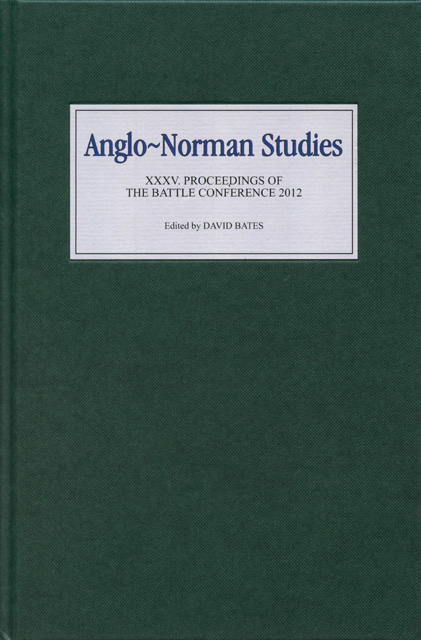Book contents
- Frontmatter
- Dedication
- Contents
- List of Illustrations and Tables
- Editor’s Preface
- Abbreviations
- A Three-Cornered Dynamic of Redemption in the ‘Long’ Thirteenth Century: Villein Manumissions and the Theology of the Incarnation (The R. Allen Brown Memorial Lecture, 2011)
- Femmes en religion, personnes d’autorité: les abbesses normandes (XIe–XIIIe siècles) (The R. Allen Brown Memorial Lecture, 2012)
- The Role of the Curator of the Bayeux Tapestry
- Early Normandy
- The Norman Conquest, Countess Adela, and Abbot Baudri
- Baldric of Bourgueil and the Flawed Hero
- John Bilson (1856–1943) and the Study of Anglo-Norman Romanesque
- The Identity of the Designer of the Bayeux Tapestry
- The Pseudo-Hugh Falcandus in His Own Texts
- The Thirteenth-Century Chronique de Normandie
- Les investitures abbatiales en Normandie: quelques réflexions autour du cas de l’abbaye du Bec-Hellouin (1034–1136)
- Robert Curthose: The Duke Who Lost His Trousers
- Sufficientia: A Horatian Topos and the Boundaries of the Self in Three Twelfth-Century Poems
- Aristocratic Acta in Normandy and England, c. 1150–c. 1250: The Charters and Letters of the Du Hommet Constables of Normandy
- Crime without Punishment: Medieval Scottish Law in Comparative Perspective
- Landscape and Belief in Anglo-Norman England
- Contents of Volumes 1–34
Early Normandy
Published online by Cambridge University Press: 28 February 2023
- Frontmatter
- Dedication
- Contents
- List of Illustrations and Tables
- Editor’s Preface
- Abbreviations
- A Three-Cornered Dynamic of Redemption in the ‘Long’ Thirteenth Century: Villein Manumissions and the Theology of the Incarnation (The R. Allen Brown Memorial Lecture, 2011)
- Femmes en religion, personnes d’autorité: les abbesses normandes (XIe–XIIIe siècles) (The R. Allen Brown Memorial Lecture, 2012)
- The Role of the Curator of the Bayeux Tapestry
- Early Normandy
- The Norman Conquest, Countess Adela, and Abbot Baudri
- Baldric of Bourgueil and the Flawed Hero
- John Bilson (1856–1943) and the Study of Anglo-Norman Romanesque
- The Identity of the Designer of the Bayeux Tapestry
- The Pseudo-Hugh Falcandus in His Own Texts
- The Thirteenth-Century Chronique de Normandie
- Les investitures abbatiales en Normandie: quelques réflexions autour du cas de l’abbaye du Bec-Hellouin (1034–1136)
- Robert Curthose: The Duke Who Lost His Trousers
- Sufficientia: A Horatian Topos and the Boundaries of the Self in Three Twelfth-Century Poems
- Aristocratic Acta in Normandy and England, c. 1150–c. 1250: The Charters and Letters of the Du Hommet Constables of Normandy
- Crime without Punishment: Medieval Scottish Law in Comparative Perspective
- Landscape and Belief in Anglo-Norman England
- Contents of Volumes 1–34
Summary
The year 2011 witnessed two 1,100th-anniversary celebrations relevant to the activities of Scandinavians overseas. On 2 September 911 a treaty designed to facilitate trade and promote good relations between the Byzantines and the Kievan Rus was agreed in Constantinople. The treaty between the Frankish king Charles the Simple and the viking army led by Rollo that marked the beginning of Normandy is almost virtual in comparison, in the absence of a text or a contemporary record; but, according to Dudo of Saint-Quentin, it too was granted in 911, at Saint-Clairsur-Epte. The exact nature of the power of the vikings on the Seine at that moment is obscure: their takeover coincided with a hiatus in Frankish annal-writing, and no contemporary evidence survives from church or court in Rouen. The earliest witness is an original charter in King Charles’s name from March 918 which granted the abbey of La Croix-Saint-Ouen and its dependencies to the monastery of Saint-Germain-des-Prés, praeter partem ipsius abbatiae quam annuimus Normannis Sequanensibus, uidelicet Rolloni suisque comitibus, pro tutela regni. The charter refers to the portio Nortmannorum but does not spell out its boundaries. From the 920s to the 990s Reims’s historians Flodoard and Richer occasionally reported on Norman affairs, but after what appears to have been almost a century without writing in Normandy itself, there was a surge in the reign of Richard II (996–1026) – charters, hagiography, and, of course, Dudo’s history, much of it closely associated with the dukes. These circumstances make early Normandy very difficult to reconstruct and assess. It is not a neglected subject, however: David Bates’s lucid analysis in his Normandy before 1066 remains the benchmark for subsequent discussion, and Lucien Musset’s enduring scholarship has been extended in recent years by Francophone and Anglophone historians with intimate knowledge of both local and wider Frankish contexts. Despite all this attention, there is no consensus about how things stood in the tenth century, before the change of gear that followed the accession of Richard II.
Although Rouen and Kiev offer many contrasts, it is a measure of Scandinavian vitality overseas that the same year saw two such successes. The degree to which the people involved belonged to the same world continues to be a matter for debate.
- Type
- Chapter
- Information
- Anglo-Norman Studies 35Proceedings of the Battle Conference 2012, pp. 45 - 64Publisher: Boydell & BrewerPrint publication year: 2013
- 5
- Cited by



